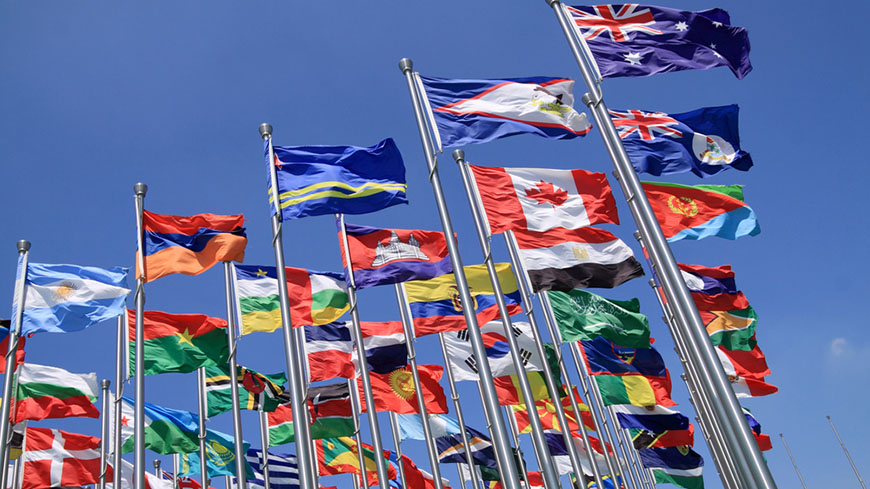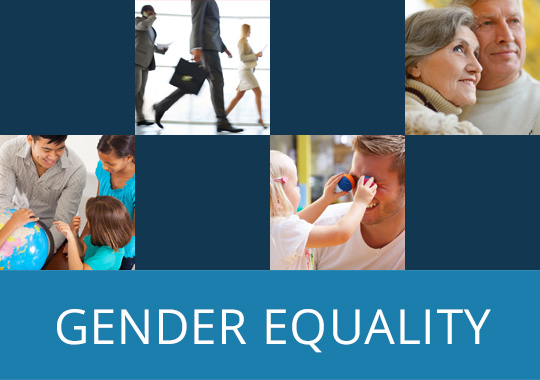Information from international organisations

Since then, most international organisations started to implement a gender-sensitive approach in their policy-making, setting up different types of institutional arrangements to facilitate gender mainstreaming and produce a variety of tools. International organisations usually implement a double approach towards gender equality, combining specific measures and policies for the promotion of women’s rights and gender equality, and gender mainstreaming activities.
Gender mainstreaming in the European Union
The European Union (EU) started to implement a gender mainstreaming approach in 1996 and in 1999 the commitment to gender mainstreaming was formalised in the Treaty of Amsterdam. The principle of gender mainstreaming is incorporated in Article 8 of the Treaty on the Functioning of the EU.
The European Union implements a dual approach of both gender mainstreaming and specific gender equality policies, including positive actions for the advancement of women.
A High Level Group on Gender Mainstreaming that includes high-level representatives responsible for gender mainstreaming at national level was established to support the work on gender mainstreaming and exchange good practices.
The European Institute for Gender Equality (EIGE), the EU agency responsible for gender equality set gender mainstreaming as one of its priorities, in order to foster gender equality in policy-making and legislative work. The EIGE website provides detailed information concerning the gender mainstreaming activities of different stakeholders and country specific information from EU countries. It gives an overview of the relevance of gender equality issues in 19 of policy areas and provides links to instruments and methods as well as good practices to implement gender mainstreaming.
Tools and documents produced by the EU on gender mainstreaming
- Gender mainstreaming platform of the European institute for Gender Equality (EIGE)
- Report on gender mainstreaming in the work of the European Parliament, European Parliament (2016)
- “Mainstreaming gender into the policies and the programmes of the institutions of the European Union and EU Member States” - EIGE, (2013)
Gender mainstreaming and the United Nations
Gender mainstreaming was established at UN level as a major global strategy for the promotion of gender equality, as reflected in in the 1995 Beijing Platform for Action.
In 1997, the United Nations Economic and Social Council defined gender mainstreaming as: “The process of assessing the implications for women and men of any planned action, including legislation, policies or programmes, in all areas and at all levels. It is a strategy for making women’s as well as men’s concerns and experiences an integral dimension of the design, implementation, monitoring and evaluation of policies and programmes in all political, economic and societal spheres so that women and men benefit equally and inequality is not perpetrated. The ultimate goal is to achieve gender equality.”
Since then, the different UN offices, funds, programmes and specialised agencies have been implementing gender mainstreaming strategies. UN Women plays an important role in ensuring and monitoring gender mainstreaming within the UN system. In 2012, the United Nations agreed on the UN System-wide Action Plan on Gender Equality and the Empowerment of Women (UN-SWAP), to implement the gender equality policy of its highest executive body, the UN Chief Executives Board. Spearheaded by UN Women, the UN-SWAP for the first time assigns common performance standards for the gender-related work of all UN entities, ensuring greater coherence and accountability, including gender mainstreaming. Within this system, all UN system organisations are required to adopt policies on gender equality and women’s empowerment.
UN Women also created a repository of all gender mainstreaming policies, strategies, action plans from UN offices, funds, programmes and specialised agencies, and of all official documentation on UN system-wide policy and strategy, and all resources and tools for capacity development on gender mainstreaming.
Tools and documents produced by UN Women on gender mainstreaming
- I Know Gender: An Introduction to Gender Equality for UN staff - This course of the UN Women Training Centre aims to develop awareness of gender equality and women’s empowerment for the integration of a gender equality perspective into the work of all UN staff at headquarters, regional and country levels.
- Gender and security: Training Manual, UN Women Sub-regional Office for Eastern Europe and Central Asia in Kazakhstan, 2012
- Gender Mainstreaming in Development Programming - Guidance Note - UN Women (2011)
Tools and documents produced by other United Nations agencies on gender mainstreaming
- Strategy for Gender Equality and the Empowerment of Women (2018–2021) of the United Nations Office at Vienna/United Nations Office on Drugs and Crime (UNOV/UNODC), 2018
- Office of the United Nations High Commissioner for Human Rights - On-Line Training Course "Gender Equality, Human Rights and Me English French Spanish
- Integrating equity, gender, human rights and social determinants into the work of the World Health Organisation, 2015
- UNESCO Gender Equality Action Plan for 2014-2021, United Nations Educational, Scientific and Cultural Organization, 2014
- Gender mainstreaming in the work of United Nations Office on Drugs and Crime - “Guidance note for UNODC staff - Gender mainstreaming in the work of UNODC”, June 2013
- Integrating Gender into Human Rights Monitoring - Office of the UN High Commissioner for Human Rights (2011)
- Gender mainstreaming for health managers: a practical approach, World Health Organisation (2011)
- Working for an equal future: UNICEF Policy on Gender Equality and the Empowerment of Girls and Women, (2010)
- Gender Equality and Non-Discrimination - ILO International Training Centre
Gender Mainstreaming in other international organisations
A number of other international organisations have been implementing gender mainstreaming strategies and producing tools to that effect, including the Organisation for Security and Cooperation in Europe (OSCE), the Organization of American States (OAS), the Organisation internationale de la francophonie and the Organisation for Economic Co-operation and Development (OECD).
- Gender mainstreaming in the Organisation for Security and Cooperation in Europe
- Handbook on mainstreaming gender equality into the OAS project cycle - Organization of American States, UNICEF, 2010
- Gender mainstreaming at the Organisation internationale de la francophonie
- Gender equality at the Organisation for Economic Co-operation and Development (OECD)
- OECD data on aid targeting gender equality and women’s empowerment
- OECD Women in Government Programme
- Gender Budgeting in OECD countries



